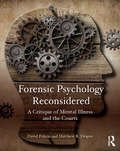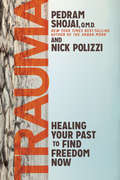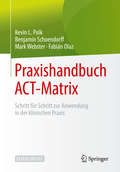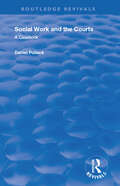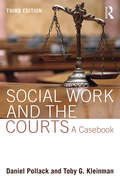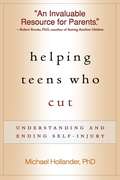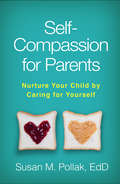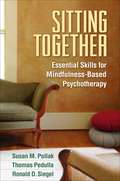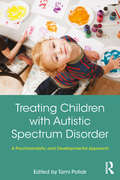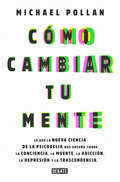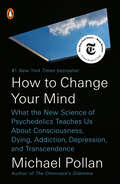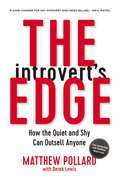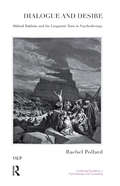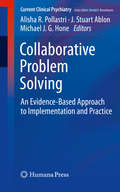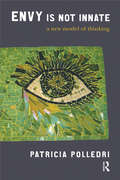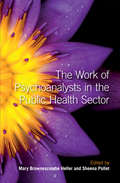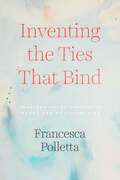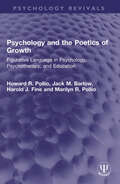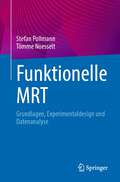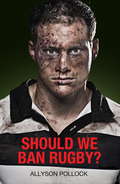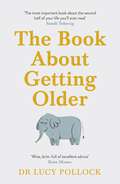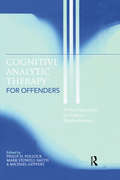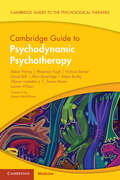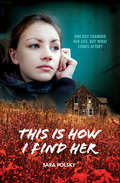- Table View
- List View
Toward a Phenomenology of Terrorism: Beyond Who is Killing Whom (Critical Criminological Perspectives)
by David PolizziThis book examines the socio-psychological dynamics and drivers of terrorism from a humanistic perspective. Most interpret terrorism as meaningless, asocial violence but this book argues that it's not just a case of seeing 'who is killing whom' but that defining and understanding terrorism is configured by historical context and immediate experience. The author argues that these acts of terrorist violence can be interpreted as the external expression of repressed feelings and impulses that have been tabooized by mainstream society. Upon release, these terrorists gain a new 'nomos' which generates a sense of meaning and significance for them. This book draws on psycho-analytical theories of repression, Heideggerian existentialism, Berger’s anthropological concept of culture as ‘nomos’, and Roger Griffin’s analysis of terrorist fanaticism, adding to the understanding terrorism and criminality from a new perspective and beyond the usual literature situated in political science, security/war and peace studies. This book seeks to provide: a definition of terrorism, an account of the psychological theory, an explanation of the nomic dimension of terroristic violence, an exploration of the relevance of the new approach to understanding: Salafi jihadism, Al-Qaeda, Islamic State, the Taliban, White Supremacism, the rise of the Radical Right, and reflections on this for combating terrorism. It appeals to those interested in terrorism, conflict, terrorist radicalization and motivation, international relations, politics and religious politics, and to counter-terrorism agencies.
Forensic Psychology Reconsidered: A Critique of Mental Illness and the Courts
by David Polizzi Matthew R. DraperForensic psychology is where psychology meets the criminal justice system. An understanding of the intersection of criminal law and psychological issues relating to criminal responsibility is critical for criminal justice students. This accessible text focuses on the criminal law implications of forensic psychology as it relates to topics such as competency to stand trial, state of mind at the time of the crime, suicide by cop, and involuntary psychiatric medication administered in custody. Unlike more traditional texts on this topic, which are primarily concerned with the clinical practice of forensic psychology, this book focuses on critical thinking as it relates to these topics. Each chapter presents a critical analysis of the topic under study, going beyond merely identifying the legal parameters of criminal responsibility to explore the ethical, philosophical, and theoretical foundations of that concept.
Trauma: Healing Your Past to Find Freedom Now
by Nick Polizzi Pedram ShojaiYou are not doomed to be trapped by your traumaTrauma is unresolved pain. It hums in the background of our lives and robs us of the joy, faith, peace, and love we fully deserve. In their groundbreaking book, Pedram Shojai, O.M.D., New York Times best-selling author of The Urban Monk and The Art of Stopping Time, and Nick Polizzi, author of The Sacred Science, take you on a journey that encompasses: • a clear understanding of trauma, where it comes from, and how it affects every part of your life • an exploration of modern and ancient therapies and practices for healing • real-life tragedies turning into stories of triumph, hope, and survival Drawn from the wisdom and insights of the world's top doctors, therapists, and experts, Trauma will show you that no matter what you have endured, how long you have carried it, or how deeply embedded it is, you can be free from pain and suffering. Your road to recovery and whole-body healing is before you, and with it the richer and more profound connections that you seek with yourself and your loved ones.
Praxishandbuch ACT-Matrix: Schritt für Schritt zur Anwendung in der klinischen Praxis
by Kevin L. Polk Benjamin Schoendorff Mark Webster Fabián OlazDieses Fachbuch bietet einen praktischen Leitfaden für den effektiven Einsatz der ACT-Matrix (als kondensierter Form der Akzeptanz- und Commitmenttherapie) in Psychotherapie, Coaching und Beratung. Praktikerinnen und Praktiker erhalten eine Schritt-für-Schritt-Anleitung sowie zahlreiche nützliche Werkzeuge für die Matrixarbeit.Zahlreiche Beispieldialoge und FAQ-Abschnitte unterstützen die klinische Praxis, wobei stets lebendige Prozesse in konkreten Kontexten, nicht schablonenhafte Lösungen, vermittelt werden. Optional lesbare Vertiefungen bieten theoretisch interessierten Praktikerinnen und Praktikern Gelegenheit, Bezüge zur Bezugsrahmentheorie herzustellen und neue abzuleiten.
Social Work & the Courts: A Casebook
by Daniel Pollack Toby G. KleinmamSocial Work and the Courts is a compendium of the most recent and important legal cases in social work and social welfare. Its dissection and analysis of crucial cases makes it an excellent tool for teaching social workers to understand the legal system and its operation. The book demonstrates how courts view and deal with the performance, action, and conduct of social workers and their agencies. This second edition includes more case studies, paying particular attention to recent cases on foster care and child welfare. In addition, a new section on "References and Further Readings" has been added to the end of each chapter along with an update bibliography and Internet bibliography so that readers may easily find supplementary information.
Social Work and the Courts: A Casebook
by Daniel Pollack Toby G. KleinmanSocial Work and the Courts is a collection of important and cutting-edge court decisions in the field of human services, now in its third edition. Pollack and Kleinman present an array of legal cases in everyday language, with clear explanation of the facts and issues, and in-depth examinations of the reasoning and implications of each decision. This new edition includes over twenty new cases, all of which happened between 2010 and 2014, making this one of the most significant and timely investigations of how social work and the law intersect. Special attention is paid to recent rulings in child welfare and social worker liability. The dissection and analysis of these influential cases makes this volume an excellent teaching tool and an essential resource for both social workers and policy makers.
Helping Teens Who Cut: Understanding and Ending Self-injury
by William Pollack Michael HollanderDiscovering that your teen "cuts" is absolutely terrifying; before you understand what really motivates cutting, you may worry your child is contemplating suicide. What can you do to help when every attempt to address the behavior seems to push him or her further away? In this compassionate, straightforward book, Dr. Michael Hollander, a leading authority on self-injury, spells out the facts about cutting--and what to do to make it stop. You'll learn how overwhelming emotions lead some teens to hurt themselves, and how proven treatments--chief among them dialectical behavior therapy (DBT)--can help your child become well again. Helping Teens Who Cut demonstrates how to talk to your teen about cutting without making it worse, and explains exactly what to look for in a therapist or treatment program. Drawing on decades of clinical experience as well as the latest research, Dr. Hollander provides concrete ways to help your son or daughter cope with extreme emotions without resorting to self-injury. You'll also learn practical communication and problem-solving skills that can reduce family stress, making it easier to care for yourself and your teen during the recovery process.
Self-Compassion for Parents: Nurture Your Child by Caring for Yourself
by Susan M. Pollak"I yelled at the kids again--and feel so ashamed." "I barely have time to shower, let alone exercise; no wonder I’m so out of shape." "I'm just not the dad I hoped I would be." Parenting is hard. That's why self-compassion is so important. In this empathic resource, mindfulness expert and psychologist Susan M. Pollak helps you let go of constant self-judgment and treat yourself with the same kindness and caring you strive to offer your kids. Simple yet powerful guided meditation techniques (most under three minutes long) are easy to practice while doing the dishes, driving to work, or soothing a fussy baby. Learn to respond to your own imperfections like a supportive friend, not a harsh critic. You will find yourself happier and more energized--and will discover new reserves of patience and appreciation for your kids.
Sitting Together
by Susan M. Pollak Thomas Pedulla Ronald D. SiegelThis practical guide helps therapists from virtually any specialty or theoretical orientation choose and adapt mindfulness practices most likely to be effective with particular patients, while avoiding those that are contraindicated. The authors provide a wide range of meditations that build the core skills of focused attention, mindfulness, and compassionate acceptance. Vivid clinical examples show how to weave the practices into therapy, tailor them to each patient's needs, and overcome obstacles. Therapists also learn how developing their own mindfulness practice can enhance therapeutic relationships and personal well-being. The Appendix offers recommendations for working with specific clinical problems. Free audio downloads (narrated by the authors) and accompanying patient handouts for selected meditations from the book are available to purchasers at the companion website.
Treating Children with Autistic Spectrum Disorder: A psychoanalytic and developmental approach
by Tami PollakTreating Children with Autistic Spectrum Disorder: A Psychoanalytic and Developmental Approach outlines a unique model, the product of over twenty years of experience in working with children with this diagnosis within "Shaked" - a multi-professional educational-therapeutic day-car unit in Israel. This book provides a comprehensive overview of this model and the psychoanalytic-developmental perspective underpinning it, which weaves together the various professional views into a single fabric integrating a therapeutic network which encompasses each and every aspect of the child's development. Drawing on psychoanalytic and developmental psychology, each chapters is devoted to the daily problems that arise when working with ASD children, such as weaning and toilet training, as well as the effects of ASD on wider family functioning, all in the context of administering treatment to young children in day-care and other non-residential settings. Treating Children with Autistic Spectrum Disorder offers an essential, practical guide which will be an asset to any clinician working with young children on the autistic spectrum, as well as the parents and siblings of these children.
Cómo cambiar tu mente: Lo que la nueva ciencia de la psicodelia nos enseña sobre la conciencia, la muerte, la adicción, la depresión y la transcendencia
by Michael PollanUna brillante y valiente investigación de Michael Pollan, autor de cinco best sellers de The New York Times, sobre la revolución médica y científica en torno a las drogas psicodélicas, y la fascinante historia de sus propias experiencias psicodélicas que le cambiaron la vida. Cuando Michael Pollan se propuso investigar por qué el LSD y la psilocibina (el ingrediente activo de las setas mágicas) brindaban un enorme alivio a las personas que padecían condiciones difíciles de tratar como el TEPT (trastorno por estrés postraumático), la depresión o la adicción, no tenía la intención de escribir lo que es indudablemente su libro más personal. Pero al descubrir cómo estas notables sustancias estaban mejorando la vida no solo de los pacientes con problemas de salud mental sino también de las personas que simplemente se enfrentaban a los altibajos de la vida cotidiana, decidió explorar los límites de la mente en primera y tercera persona. Así comenzó una singular aventura entorno a la experiencia de la conciencia alterada, así como una profunda inmersión en el estudio de la neurociencia más pionera y la toma de contacto con una prodigiosa comunidad subterránea de expertos psicodélicos. En esta ejemplar investigación periodística, Pollan revisa archivos históricos y documentos científicos para separar la verdad sobre estas misteriosas drogas de los mitos, la propaganda y el pánico moral que se ha ido acumulando desde los años sesenta, cuando un puñado de personajes rebeldes catalizaron una poderosa reacción contra lo que entonces era un prometedor campo de investigación. Sugerente, polémico y deslumbrante este libro es el resultado de un viaje a una nueva, emocionante e inesperada frontera de la percepción, de nuestra comprensión de la mente, del yo y de nuestro lugar en el mundo.
How to Change Your Mind: What the New Science of Psychedelics Teaches Us About Consciousness, Dying, Addiction, Depression, and Transcendence
by Michael PollanNew York Times Book Review 10 Best Books of 2018A New York Times Notable Book The #1 New York Times bestseller.A brilliant and brave investigation into the medical and scientific revolution taking place around psychedelic drugs--and the spellbinding story of his own life-changing psychedelic experiences When Michael Pollan set out to research how LSD and psilocybin (the active ingredient in magic mushrooms) are being used to provide relief to people suffering from difficult-to-treat conditions such as depression, addiction and anxiety, he did not intend to write what is undoubtedly his most personal book. But upon discovering how these remarkable substances are improving the lives not only of the mentally ill but also of healthy people coming to grips with the challenges of everyday life, he decided to explore the landscape of the mind in the first person as well as the third. Thus began a singular adventure into various altered states of consciousness, along with a dive deep into both the latest brain science and the thriving underground community of psychedelic therapists. Pollan sifts the historical record to separate the truth about these mysterious drugs from the myths that have surrounded them since the 1960s, when a handful of psychedelic evangelists inadvertently catalyzed a powerful backlash against what was then a promising field of research.A unique and elegant blend of science, memoir, travel writing, history, and medicine, How to Change Your Mind is a triumph of participatory journalism. By turns dazzling and edifying, it is the gripping account of a journey to an exciting and unexpected new frontier in our understanding of the mind, the self, and our place in the world. The true subject of Pollan's "mental travelogue" is not just psychedelic drugs but also the eternal puzzle of human consciousness and how, in a world that offers us both suffering and joy, we can do our best to be fully present and find meaning in our lives.
The Introvert's Edge: How the Quiet and Shy Can Outsell Anyone
by Matthew Pollard Derek LewisAn introvert? Great at sales? YES.Sales is a skill anyone can learn and master — and introverts are especially good at it once they learn how to leverage their natural strengths.Introverts aren’t comfortable with traditional tactics like aggressively pushing a product or talking over a customer’s objections. That’s the beauty of The Introvert’s Edge: it doesn’t focus on the sale itself but on a sales system that helps introverts feel sincere instead of sales-y. Powerful and practical, the book reveals how to:Find natural confidencePrepare for every situationPresent your value so that customers want to buySidestep objectionsJudge when the customer’s ready to buyAsk for the sale — without askingContinually adapt and improveProfit from a process that doesn’t rely on personalityEnjoy salesWith stories of introverted entrepreneurs, salespeople, and business owners who went from stagnant to success, The Introvert’s Edge shows you how to succeed in sales — without changing who you are.
Dialogue and Desire: Mikhail Bakhtin and the Linguistic Turn in Psychotherapy
by Rachel PollardThis book is an exploration of the relationship between the Russian philosopher, Mikhail Bakhtin, and contemporary dialogical psychotherapy, describing the psychoanalytic and linguistic conception of the dialogical self.
Collaborative Problem Solving: An Evidence-Based Approach to Implementation and Practice (Current Clinical Psychiatry)
by Alisha R. Pollastri J. Stuart Ablon Michael J.G. HoneThis book is the first to systematically describe the key components necessary to ensure successful implementation of Collaborative Problem Solving (CPS) across mental health settings and non-mental health settings that require behavioral management. This resource is designed by the leading experts in CPS and is focused on the clinical and implementation strategies that have proved most successful within various private and institutional agencies. The book begins by defining the approach before delving into the neurobiological components that are key to understanding this concept. Next, the book covers the best practices for implementation and evaluating outcomes, both in the long and short term. The book concludes with a summary of the concept and recommendations for additional resources, making it an excellent concise guide to this cutting edge approach. Collaborative Problem Solving is an excellent resource for psychiatrists, psychologists, social workers, and all medical professionals working to manage troubling behaviors. The text is also valuable for readers interested in public health, education, improved law enforcement strategies, and all stakeholders seeking to implement this approach within their program, organization, and/or system of care.
Envy is Not Innate: A New Model of Thinking (Forensic Psychotherapy Monograph Ser.)
by Patricia PolledriThis book is a comprehensive revision of the notion of envy, suggesting that envy is not innate and proposing some fresh ideas about its relation to psychopathology, offering a working model of development which is highly relevant to clinical practice.
The Work of Psychoanalysts in the Public Health Sector
by Sheena Pollet Mary HellerThis book provides a comprehensive insight into the ways in which psychoanalysts think and work. Mary Brownescombe Heller and Sheena Pollet bring together internationally known contributors trained at the Institute of Psychoanalysis to explore the broad range of clinical work, thinking, and teaching undertaken with children, families, adults and staff by psychoanalysts in the UK public health sector. Divided into four sections, The Work of Psychoanalysts in the Public Health Sector covers: clinical work with parents and young children, clinical work with adults and their families, analytic thinking in health service practice analytic support for health service staff. Experienced psychoanalysts discuss work with various client groups including parents with babies, children, adolescents who self harm, and adults with serious mental health conditions and psychosis. The book also explores how psychoanalytically-informed work can be used alongside other treatment methods, and how health service staff can best be trained and supported. The Work of Psychoanalysts in the Public Health Sector offers the reader a broad perspective and a clear understanding of the various analytical concepts used in clinical practice. It will be invaluable reading for anyone interested in, or already using psychoanalytic ideas and techniques in the health sector, as well as students in training.
Inventing the Ties That Bind: Imagined Relationships in Moral and Political Life
by Francesca PollettaFrom deciding to hold the door for the person behind you, to resolving for whom you will cast your vote, every day we find ourselves charged with making moral decisions. What steers our choices? And how do we weigh competing priorities and moral convictions? In Inventing the Ties That Bind, Francesca Polletta shows that we do not solve these dilemmas, whether personal or political, based on self-interest alone. Instead, relationships serve as a kind of moral compass. People consider the nature of their ties to one another to know what their obligations are, and in situations that are unfamiliar, they sometimes figure out the right thing to do by imagining themselves in relationships they do not actually have. Polletta takes up a wide range of cases, from debt settlement agencies to the southern civil rights movement, revealing that our relationships and how we imagine them are at the heart of our moral lives—guiding us as we choose whom to help and how we define what it means to treat someone as our equal. In a time of growing polarization, understanding how we make sense of our ties to one another is more urgent than ever.
Psychology and the Poetics of Growth: Figurative Language in Psychology, Psychotherapy, and Education (Psychology Revivals)
by Howard R. Pollio Jack M. Barlow Harold J. Fine Marilyn R. PollioIn this volume, originally published in 1977, the authors describe the relevance of figurative language for the psychology of language and present a methodological approach best described as naturalistic in orientation. The first section presents the idea of figurative language in terms of linguistic, aesthetic, and philosophical background. Also included is a description of empirical techniques used to assess figurative language and findings from an analysis of widely differing spoken and written contexts. The second section of this volume deals with the occurrence and significance of figurative language within the specific context of psychotherapy. The use of such language is shown to be crucial in patient insight. The third section deals with children, their understanding and use of figurative expressions, specifically within the school. Here is a volume that was an outstanding addition to the literature at the time and still a valuable resource today.
Funktionelle MRT: Grundlagen, Experimentaldesign und Datenanalyse
by Stefan Pollmann Tömme NoesseltDie Funktionelle Magnetresonanztomographie (fMRT) hat sich als bahnbrechendes Instrument in den humanen Neurowissenschaften etabliert und wird in verschiedenen Disziplinen wie Medizin, Psychologie und Biologie sowohl für grundlagenwissenschaftliche als auch klinische Untersuchungen eingesetzt. "Einführung in die Funktionelle Magnetresonanztomographie" bietet eine verständliche Einführung in die Grundlagen der fMRT sowie eine ausführliche Erklärung der Designprinzipien von fMRT-Experimenten und der komplexen Schritte der Datenanalyse, einschließlich moderner multivariater Analyseverfahren.Dieses Buch ist sowohl für Einführungskurse auf Masterniveau als auch zum Selbststudium bei der Durchführung von fMRT-Projekten geeignet. Es führt den Leser durch alle notwendigen Schritte, angefangen von der Entwicklung eines Experiments bis hin zur Analyse und Präsentation der Daten sowie ihrer Interpretation. Dabei bringen die Autoren nicht nur ihre eigene Expertise als Mitentwickler der fMRT-Methodik ein, sondern veranschaulichen auch anhand eigener Untersuchungen die praktische Anwendung.Egal, ob Sie Einsteiger oder bereits erfahrener Forscher sind, dieses Buch wird Ihnen dabei helfen, Bildgebungsstudien besser zu verstehen und die fMRT zielgerichtet für Ihre neurowissenschaftliche Forschung zu nutzen.
Tackling Rugby
by Allyson PollockOn 29 January 2011, Benjamin Robinson was playing rugby for his school. During the match he sustained a concussion but was not taken off, and was allowed to continue with the game, in which he endured a second impact. When play ended, he collapsed, dying two days later as a result of his injuries. Every week young children are hospitalized on the playing fields of Britain. Yet the subject is rarely investigated, injury data are not systematically collected, and as a result any real attempt to work out how to make youth rugby safer is flawed. Using meticulous, peer-reviewed research, leading public health specialist Allyson M. Pollock sets out the true risks associated with the sport, raising uncomfortable questions for politicians and the educational authorities.From the Trade Paperback edition.
The Book About Getting Older: The essential comforting guide to ageing with wise advice for the highs and lows
by Lucy PollockThe honest, compassionate and vital guide to getting older, from dementia to finances, medication to care homes'The most important book about the second half of your life you'll ever read. I wish everyone in the UK could be under Dr Lucy's care' SANDI TOKSVIG'This warm and compassionate book gets to the heart of older age' THE BRITISH GERIATRICS SOCIETY________Now more than ever, we need to talk about getting older.Many of us are living to a very great age. But how do we give those we love, and eventually ourselves, long lives that are as happy and healthy as possible?Dr Lucy's book gives us answers to the questions we can voice - and those that we can't. This essential guide will guide you through those important conversations around growing older, answering every question you might have, including:· How do we start the conversation?· How do we ask whether it's worth taking seven different medicines?· Is it normal to find you're falling out of love with someone, as they disappear into dementia?· Should Dad be driving, and if not, who can stop him?· What are the secrets of the best care homes?· When does fierce independence become bad behaviour?· How do you navigate near-impossible discussions around resuscitation and intensity of treatments?· And who decides what happens when we become ill?Serious, funny, kind and knowledgeable, this readable book helps guide us through essential conversations about getting older that go straight to the heart of what matters most.
Cognitive Analytic Therapy for Offenders: A New Approach to Forensic Psychotherapy
by Philip H. Pollock Mark Stowell-Smith Michael GöpfertCognitive analytic therapy (CAT) is an established form of integrated psychotherapy, which has been applied in a variety of clinical settings to a diversity of disorders with promising outcomes. In Cognitive Analytic Therapy for Offenders, the authors describe the application of CAT to forensic settings, illustrating the use of this type of therapy with a range of offence types and clinical disorders. CAT is presented as a new form of forensic psychotherapy which can enhance the understanding, conceptualisation, treatment and management of offenders. The book offers a novel description of clinical practice and describes the innovative application of cognitive analytic therapy to forensic work in a variety of contexts and settings for numerous offence types and clinical disorders, including: CAT in the treatment of child sex offenders in secure forensic settings the use of CAT with women in secure settings CAT for parents within prisons CAT for borderline and psychopathic personality disorder CAT for a stalking offender community-based CAT with perpetrators of domestic violence CAT for homicide perpetrators (rage-type, serial sexual, dissociative homicides) the application of CAT for Court reporting and managing boundary violations. This book provides an account of a fresh, new approach to conceptualisation and treatment in forensic psychotherapy, and offers the first description of CAT presented in the form of a compilation of illustrations of practice. It will be essential reading for clinical psychologists and psychiatrists, occupational therapists, and anyone who works within services for offenders.
Cambridge Guide to Psychodynamic Psychotherapy (Cambridge Guides to the Psychological Therapies)
by Adam Polnay Rhiannon Pugh Victoria Barker David Bell Allan Beveridge Adam Burley Allyson Lumsden C. Susan Mizen Lauren WilsonA unique and accessible guide to contemporary psychodynamic therapy and its applications. An author line-up of experienced educators guide the reader through the breadth of psychodynamic concepts in a digestible and engaging way. The key applications of psychodynamic psychotherapy to a range of presentations are explored, including anxiety, depression, problematic narcissism as well as the dynamics of 'borderline' states. Specific chapters cover the dynamics of anger and aggression, and working with people experiencing homelessness. A valuable resource for novice and experienced therapists, presenting a clear, comprehensive review of contemporary psychodynamic theory and clinical practice. Highly relevant for general clinicians, third-sector staff and therapists alike, the authors also examine staff-client dynamics and the development of psychologically-informed services underpinned by reflective practice. Part of the Cambridge Guides to the Psychological Therapies series, offering all the latest scientifically rigorous, and practical information on a range of key, evidence-based psychological interventions for clinicians.
This Is How I Find Her
by Sara PolskySophie has always lived her life in the shadow of her mother's bipolar disorder: monitoring medication, making sure the rent is paid, rushing home after school instead of spending time with friends, and keeping secrets from everyone.But when a suicide attempt lands Sophie's mother in the hospital, Sophie no longer has to watch over her. She moves in with her aunt, uncle, and cousin--a family she's been estranged from for the past five years. Rolling her suitcase across town to her family's house is easy. What's harder is figuring out how to rebuild her life.And as her mother's release approaches and the old obligations loom, Sophie finds herself torn between her responsibilities toward her mother and her desire to live her own life. Sophie must decide what to do next.

